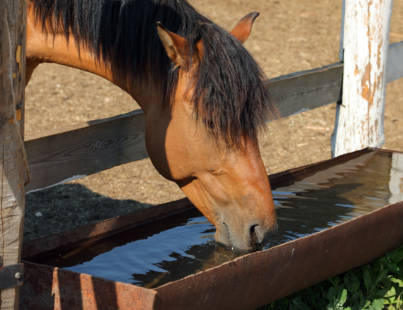Wednesday 25th July, 2018

2018 has seen one of the hottest summers on record. While that is good news for those of us who love sunbathing, it is not great for our horses. Relentless heat can cause severe health conditions, the most serious of which is dehydration. A lack of fresh water can quickly lead to disorientation and collapse, and dehydration is especially dangerous during the competition season.
There are many causes for dehydration in horses. Firstly, there is a lack of fresh water supply. Secondly there are the physical demands placed on a horses body during training and exercise. Horses are designed to lose heat through the process of sweating, and when they sweat, they lose a great deal of electrolytes. Competition horses lose up to 15 litres of fluid per hour, which means that replacing lost fluids and electrolytes is vital for survival.
It is vital to know the signs of equine dehydration. The most common signs are lethargy, and strong smelling, dark urine. The mucous membranes become congested when horses are dehydrated and they will appear to be a deep red colour. Also, your horse’s skin will not spring back immediately when pinched between the thumb and the forefinger. This is known as skin tenting. Severely dehydrated horses may also present with sunken eyes and a ‘tucked up’ confirmation. These cases require immediate veterinary attention. Worst case scenario, dehydration leads to collapse and organ failure if left untreated, therefore it is vital that you spot the signs early on.
In most cases, the simplest and most effective treatment is to offer fresh, clean water immediately and provide a well ventilated stable. Dehydrated horses have often been turned out for long periods or endured intensive training without adequate fresh water supply. This coupled with heat can quickly lead to exhaustion. Cool your horse with a hose and offer clean drinking water as soon as possible. Severely dehydrated horses will require electrolyte therapy to replace the salts lost from the body tissues. If you have any doubts about your horse’s health or level of dehydration please contact your Veterinarian immediately.